Much more than a soupcon of Shtisel
Brigit Grant presents the story behind the recipes in the Israeli drama we simply can’t live without
Charedi cafes are rarely cited for their contribution to global culture. For klops and blintzes possibly, but that was as far as it went, until writers Yehonatan Indursky and Ori Elon came up with an Orthodox Jewish drama at 11 Malchei in Jerusalem, otherwise known as the Shtisel restaurant.
The kosher café has always been popular, but this pales to the colour of calf’s foot jelly when compared to the adoring fan base for the TV series which shares its name. Still, there was clearly something about the scent of tzimmes in the air that lingered in the hearts and minds of the sagacious authors Yehonatan Indursky and Ori Elon as the series is full of food.
In Shtisel, food is the glue in familial relationships, the solace for heartbreak and the conduit to communication.
Not an episode passes without the making, serving and consumption of a dish that alludes to a character’s mindset; and often the simplest food (tomatoes and cucumber) gets eaten in the most complex scenes.
Get The Jewish News Daily Edition by email and never miss our top stories Free Sign Up

We are given a menu of familiar Jewish/Israeli dishes that run the emotional gamut, taking us from laughter to tears without the
peeling of a single onion. Replicating the recipes in your own kitchen
will not be like ordering cholent at Anshel’s, but hopefully it will authentically fill your tum until the show returns.
STARTERS
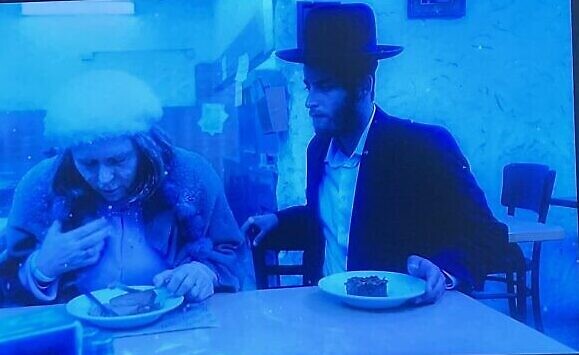
We are introduced to the Shtisel family a year after Dvora, the matriarch of the family, has died. In episode one, the son, Akiva, a handsome yeshiva teacher who secretly paints, has a dream about his late mother in which she is seated, at a table in Anshel’s diner, surrounded by eskimos with a penchant for pickles. As snowflakes fall (indoors), Akiva announces his surprise at her presence.
“I missed the kugel,” says the near-frozen Dvora. The icy coldness of separation and grief juxtaposed with Jewish humour and gherkins sets the ingenious style of what’s to come.
Potato Kugel (feeds 12 Shtisels)
Ingredients
4 pounds russet (or other floury) potatoes, peeled and quartered
3 medium onions, peeled and quartered
4 large eggs
4 large egg whites
¼ cup plus 2 tablespoons melted chicken schmaltz or vegetable oil, divided
1 teaspoon baking powder
1 ½ tablespoons salt
1 teaspoon finely-ground white pepper
Optional fresh parsley and chives
for garnish
• Heat the oven to 400ºF / 200ºC.
• Oil a baking dish.
• Using a grater or food processor, coarsely grate the potatoes and onions.
• Let the mix stand, then place it in a colander or clean tea towel to squeeze out excess liquid.
• In a large bowl, beat the eggs, oil, flour, salt and pepper together.
• Add the grated potatoes and onions to the egg-flour mixture. Mix with a large spoon until smooth.
• Pour the kugel mix into the dish
and smooth the top with a spatula.
• Bake the kugel, uncovered, in the
heated oven for one hour, or until
golden-brown on top. When the kugel is done, a knife inserted in the centre should come out clean.
• Leave the dish to cool, then serve garnished.
SNACKS

Everyone eats in Shtisel, but none
more so than patriarch Shulem, who never refuses free nosh, notably served by a woman willing to court him with her kishkes. At home in the humble family apartment, the widower relies on Akiva to cook, and classic moments occur at the kitchen table between father and son. Akiva is slow to master sandwiches, but Shulem compliments his omelettes.
Equating his eggs skills with his talent for painting is tough on the tortured artist. Giti, the daughter, is also a tortured soul, but has her mother’s gift for making grivalach, which she prepares for the meal to mark the end of mourning. The smell of the sizzling chicken skin fuels a silent, but intense exchange between Akiva and Elisheva, the woman he loves from afar who needs to borrow a heater – another smart euphemism for unspoken desire.

Grivalach
Ingredients
Chicken skin, preferably large pieces from a whole breast/ leg-thigh combo
Salt and pepper or other seasoning
of choice
• Boil ½ inch of water in a saucepan.
• Add the chicken skin and blanch for
15-20 seconds until it is fully cooked.
• Remove skin and place on a paper
towel to absorb excess water.
• Once the skin is cool enough to handle, pull off any big pieces of fat or meat.
• Transfer the skin to a plate, season
with salt and pepper or any other
sprinkle you like.
• Fill a frying pan with ½ inch of oil and
heat it.
• Drop the skin into the pan and wait for it
to turn golden and crispy. Don’t touch it until the spattering stops. Let it cool before eating.
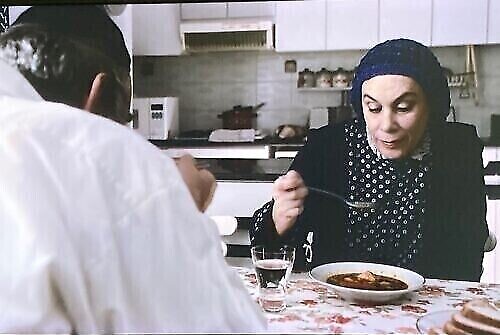
Entrée
The German-Jewish poet Heinrich Heine described cholent as ‘a ray of light immortal’ and the slow-cooked stew ignites the friendship between Shulem and school secretary, Aliza Gvili. The cosy dinners for two are Shulem’s way of masking his grief, but Aliza is misled so hands him chicken soup in Tupperware and shuts the door.
Fast track cholent
(serves 8 Shtisels or a famished 6)
Ingredients
2 onions, chopped
2 small potatoes, cubed
2 pounds beef stewing meat, cubed
2-4 marrow bones, optional
1 cup pearl barley
½ cup kidney beans
1 tablespoon paprika
1 teaspoon cumin
1 teaspoon turmeric
½ teaspoon chilli powder
2 tablespoons honey
1 kishka, optional
3-4 cups of water
Salt and pepper to taste
• Place the onions and potatoes in the bottom of a slow cooker.
• Top with the beef and marrow bones. Sprinkle the meat with salt and pepper.
• Add the barley and kidney beans, then sprinkle over the paprika, cumin, turmeric and chilli powder.
• Drizzle honey on top of the cholent, then pour the water over the top to cover
the beans.
• Cover the slow cooker and cook on
a slow heat overnight, or for at least
eight hours.
MAIN COURSE
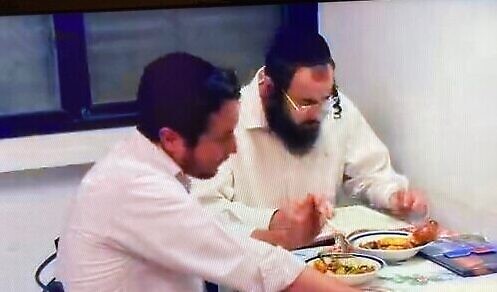
Shtisel’s focus is the human experience – albeit within the confines of orthodoxy – and immerses us in birth, betrothals
and death served with refreshments.
A bris, several shivas and a stone-setting are shared with the audience, who feel the loss, but we also get a glimpse of the after-life as the departed appear in the oddest places to deliver sage-like observations to the living. Twice-widowed Elisheva even cooks for her deceased spouses, who moan about the seasoning – “You know I don’t like spicy food”, and Shulem buys a Stollen for the widow of a former colleague. “It is baked at the start of winter and the longer it stands the better it tastes,” he tells her. Who knew the Eastern European cake had such meaning, but it registers because she is soon making him Hungarian Lecso (stew).

Lecso
Ingredients
- ¼ cup of oil (for sautéing)
- 1 small onion, diced
- 2 squash, peeled and cubed
- 2 plum tomatoes, cubed
- A punnet of fresh mushrooms,
sliced thinly - 1 small can of tomato sauce
- salt
- black pepper
- sugar
Instructions
• Sauté the diced onion in oil in a frying pan for 8-10 minutes on a medium flame.
• Add the squash, cubed tomatoes and mushrooms and sauté for 20 minutes while stirring occasionally.
• Add salt, pepper and sugar to taste and then add the small can of tomato sauce.
• Leave it to cook for another 10 minutes.
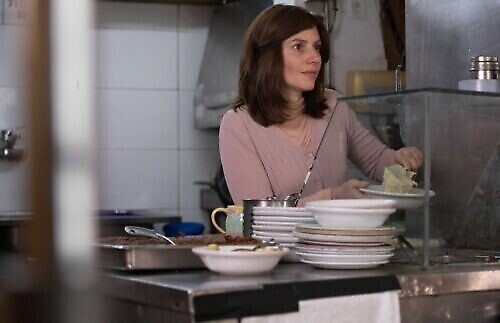
EXTRAS
Soup has always been a liquid solution for Jews, with chicken soup as the star fix. The Shtisels, who have a background as ‘chalmers’, a Yiddish term for strictly-Orthodox Jews who have lived in Jerusalem since the mid-19th century, are also soup lovers.
When Akiva’s first cousin Libbi arrives, the first thing she does is make ‘soup mit nisht’ (soup from nothing), and her raid on the fridge proves a hit with our hero.
The matchmaker, Menucha, shares her soup ‘croton’ recipe (leftover dried challah marinated in olive oil and fried) with Shulem, and although Giti is a super soup maker, it is her meatballs and mashed potatoes that bring in the punters at Weiss, her new restaurant.
Soup from nothing – Zup mit nisht recipe
Ingredients
1 onion, 1 courgette, 1 large potato
1 swede, 3 carrots, 2 bay leaves
Stock, salt and pepper
• Chop the vegetables into small cubes.
• In a saucepan, fry the onion until
browned.
• Add 2 litres of hot stock to the pan
and then add the rest of the veg.
• Season with salt and pepper.
• Cook over a medium heat until the vegetables are tender.
• Blend if desired.
AFTERS
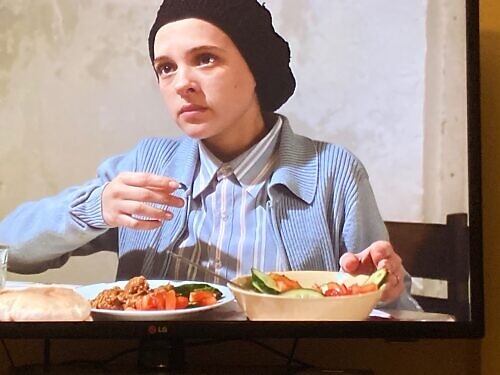
Only a fool would share a recipe for chicken soup with other experts, and the soup mit nisht, which owes its origin to poor Jews in Eastern Europe, was typically a borsht or krupnik made of barley, potatoes and fat, which is easy to produce. So let’s look at food as an influencer in Shtisel, be it Giti’s daughter, Ruchami, taking a food parcel to yeshiva student Hanina, which leads to wedlock, or Akiva’s childhood memory of sucking a lemon with Libbi, which leads to…well, we shall see in season three. Ultimately it is the modest Bubaleh that makes the biggest impact, as Shulem’s younger brother fails in his attempt to use it to borrow money and unearths a deep fraternal conflict. No amount of sugar could sweeten that Hungarian pancake, but you might like to give it a try.
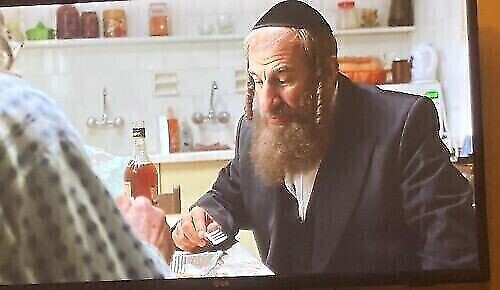
Bubalehs
(serves two feuding Shtisels)
Ingredients
- 3 eggs, separated
- 4oz fine matzo meal (1 cup)
- zest of 1 lemon
- butter, for frying
- sugar, to serve
• Beat the egg whites until stiff.
• Slowly fold in the yolks, matzo meal
and lemon zest.
• Melt the butter in a heavy frying pan.
• Carefully drop large spoonfuls of the batter into the pan.
• Fry on one side until done, then gently flip over and continue cooking on the other side.
• Sprinkle with sugar and enjoy bubbala.

Thank you for helping to make Jewish News the leading source of news and opinion for the UK Jewish community. Today we're asking for your invaluable help to continue putting our community first in everything we do.
For as little as £5 a month you can help sustain the vital work we do in celebrating and standing up for Jewish life in Britain.
Jewish News holds our community together and keeps us connected. Like a synagogue, it’s where people turn to feel part of something bigger. It also proudly shows the rest of Britain the vibrancy and rich culture of modern Jewish life.
You can make a quick and easy one-off or monthly contribution of £5, £10, £20 or any other sum you’re comfortable with.
100% of your donation will help us continue celebrating our community, in all its dynamic diversity...
Engaging
Being a community platform means so much more than producing a newspaper and website. One of our proudest roles is media partnering with our invaluable charities to amplify the outstanding work they do to help us all.
Celebrating
There’s no shortage of oys in the world but Jewish News takes every opportunity to celebrate the joys too, through projects like Night of Heroes, 40 Under 40 and other compelling countdowns that make the community kvell with pride.
Pioneering
In the first collaboration between media outlets from different faiths, Jewish News worked with British Muslim TV and Church Times to produce a list of young activists leading the way on interfaith understanding.
Campaigning
Royal Mail issued a stamp honouring Holocaust hero Sir Nicholas Winton after a Jewish News campaign attracted more than 100,000 backers. Jewish Newsalso produces special editions of the paper highlighting pressing issues including mental health and Holocaust remembrance.
Easy access
In an age when news is readily accessible, Jewish News provides high-quality content free online and offline, removing any financial barriers to connecting people.
Voice of our community to wider society
The Jewish News team regularly appears on TV, radio and on the pages of the national press to comment on stories about the Jewish community. Easy access to the paper on the streets of London also means Jewish News provides an invaluable window into the community for the country at large.
We hope you agree all this is worth preserving.
-
By Laurent Vaughan - Senior Associate (Bishop & Sewell Solicitors)
-
By Laurent Vaughan - Senior Associate (Bishop & Sewell Solicitors)
-
By Laurent Vaughan - Senior Associate (Bishop & Sewell Solicitors)
-
By Laurent Vaughan - Senior Associate (Bishop & Sewell Solicitors)






















